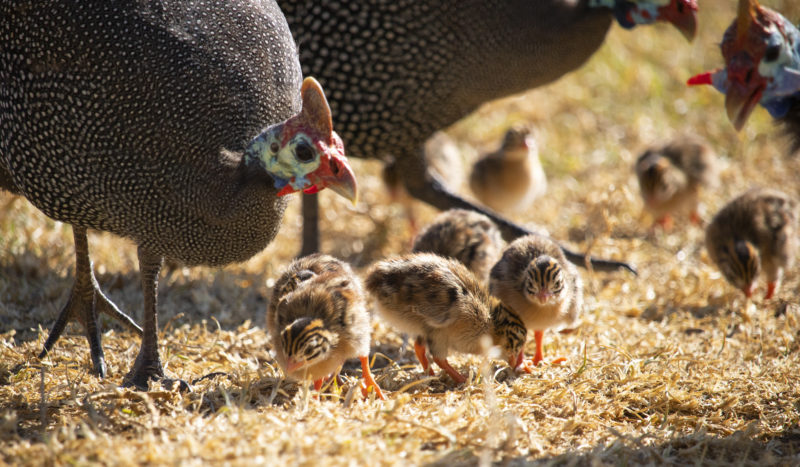Jonathon Engels presents the good, the bad, and the guidelines to raising guinea fowl, so you can decide if this bird is right for you.
My first encounter with a guinea fowl – and it is a memorable experience – happened in the jungles of Belize. My wife, Emma, and I were volunteering at a cacao farm, and a guinea named Pip lived there. Pip was the lone survivor of a guinea massacre that had occurred a couple of years prior, and he had taken on a trio of German shepherds as his new flock. Where they went, so did Pip, despite the fact that Quinn, the youngest female shepherd, had the tendency to put Pip’s head in her mouth – just to see how it felt, I guess.
Over the next six months, Pip became a fixture in my life. He slept perched outside my cabin window, a whistling snore emanating all night long. He went on long hikes with me, Emma, and the three dogs. Occasionally, he came down to the gardens in hopes of scarfing down any scorpions we might’ve stumbled upon. Pip had no boundaries and more than 50 acres of rainforest to explore, but he stuck by his unorthodox flock, of which we had incidentally become part.
Even though Pip would periodically perform this odd matador move in which he ran out in front of me, turned with a wing covering his head, then doubled back in a false charge, I felt we had a good thing. Hey, all relationships have their mysteries. This is to say that I like guinea fowl. Or, at least, I liked Pip, who has since departed us after Quinn decided to push the boundaries a little too far one day. So, in Pip’s honor, let’s talk guinea fowl.

Pip the guinea fowl opted to linger near his “flock” on the cacao farm. Photo by Emma Gallagher.
The Good
In terms of raising birds or animals on a homestead, there’s a lot positive to be said about guinea fowl. They are keen to contribute to the overall wellbeing of the farm, require little in the way of money or care, and are characteristically entertaining. While Pip had an unusual flock, he was no exception to the rule.
Prime protection: Guinea fowl are highly aware of what’s happening around them, and they will alert the entire farm about predators or intruders, from hawks to humans. They’ll even attack some predators. Chickens learn to heed a guinea’s warnings, which keeps them safer.
Pest control: Beyond other birds, guinea fowl are unbelievable pest controllers. They devour ticks, garden pests, and even stinkbugs. They are known to eat snakes, love scorpions, and will go after mice. Even better, unlike chickens, they don’t destroy gardens while doing this.
Low cost: Guinea fowl are basically wild birds. They happily feed themselves on the above list of pests and require little or nothing more. In colder climates, they may need a dietary boost in winter, when bugs are hard to come by.
Seasonal eggs: Like other hens, guinea hens lay eggs, and though they do so seasonally and wherever they like, they can supply about 60 to 100 eggs per year. Guinea eggs are high in protein, and they’re great for travel because they have exceptionally hard shells.
Quality meat: For those who raise animals to eat, guinea fowl can provide a low-input option to include in the barnyard menagerie. Many who have tried guinea meat have said it’s delicious, tasting somewhere between pheasant and turkey.
Attractive plumage: Guinea fowl aren’t especially handsome birds, more recognizable for the odd protuberance rising from their heads or the strange red flaps flipping out from their checks, but their feathers are beautiful. Emma has had a Pip feather in her hat for five years now.


A guinea fowl’s strange helmet on its head and red wattles on the sides of its face are two of its recognizable parts. Photos by Emma Gallagher.
Funny fowl: While many birds are entertaining, few, if any, are as funny as guinea fowl. They look funny, like something out of a child’s imagination. They make funny noises, constantly whistling and wheezing. They go where they want, fearlessly and wildly. They are worth having just to watch.
Super sturdy: Free-ranging guineas – and that’s how they need to be – are not fans of snow, but they are big-time survivors. They can adapt to severe temperatures, hot or cold. Also, never having been bred fully for commercial purposes, they have remained largely disease-resistant.

A guinea fowl’s assertive personality and need to roam may make raising them difficult for some. Photo by Emma Gallagher.
The Bad
Guinea fowl fans are numerous, but there are those who can’t justify dealing with them. They are particularly difficult birds for small spaces with nearby neighbors. In other words, before going full-on guinea, here are some things worth knowing:
Loud voices: Guineas chatter ceaselessly, even more so than chickens. They whistle and click as they go about their daily rounds pleasantly pecking out pest. Emma and I couldn’t stop replicating Pip’s song as we worked. That said, the guinea fowl alarm is something altogether different – jarring. Guinea fowl make sure everyone knows they think something isn’t right, and that sounds much like an air raid siren. And, they often sleep in trees near the house, so if a rooster crowing bothers you….
Wild birds: Guinea fowl don’t like being caged or penned, and unless clipped, they will fly to freedom. They are much more capable flyers than chickens. They don’t worry much with boundaries, and are willing to congregate in roadways or on the neighbor’s porch if that suits them. They won’t hesitant to perch right on the roof if they want. If a tame, well-behaved bird is the goal, guinea fowls are not the right choice.
Domineering fowl: Among other birds and animals, guinea fowl will hold their own, and they might get rough when doing so. Pip would attack me (pecking at my feet) regularly, and it worked for keeping me in line most the time. But young children might not be as amused by it. Guinea fowl will most certainly do the same with chickens, ducks, and even turkeys.

Raising guineas as keets can help keep the birds close to home, as fully grown guineas may leave if bought during adulthood. Photo by Adobe Stock/Global News Art.
The Guide
After having heard the good and bad, if keeping guinea fowls still sounds like fun, then it’s important to note that they are different from chickens. In many ways, they are much easier to deal with, but there are some things for which to prepare.
Acquiring birds: Eggs can be incubated for guinea fowl, but the easier option is to order day-old keets. Because some sense of home can be established with keets, they are also a much better option than full-grown birds, which are prone to fly their new coop and go completely rogue, never to be seen again.
Raising keets: On the whole, guinea keets can be raised much like baby chicks: a cardboard box and a light bulb to keep them warm. However, they should be given starter feed for wild birds, or they can be given starter for commercial turkeys. At four weeks, they can be switched to a grower ration (18 percent protein). Of course, water is crucial.
Establishing home: As with raising free-range or “wild” chickens, guinea fowl should be trained to recognize your home as their home. That means they need to be kept confined for a little while. Additionally, they should be released one bird at a time, one a day, with the females first followed by the males. Because they stay loyal to their flocks, the released birds will hang around despite being free to roam.
Staging habitat: Being self-reliant, guinea fowl will find what they need to survive. But setting the stage with those things can help to keep them from going too far afield. They need dust baths, a source of water, and plenty of insects. They like to sleep in trees, and they like the space to wander. Most rural homesteads have these things in abundance.
Getting payback: Guinea hens produce eggs seasonally, typically around 100 a year. They like to nest in depressions with good cover in the wild. If the nest is tampered with (i.e. the eggs are removed) they’ll change locations, so it’s good to wait for a good clutch before collecting them. They lay in clusters of 20 to 30 eggs (one a day) from spring to autumn. As for meat, guinea is a lot like pheasant and has a slightly higher percentage of meat than chickens. Hens taste better and have lots of breast meat.
While guinea fowl aren’t for everyone, for those who enjoy them, there is no substitute. They are unique birds with a healthy mix of plucky wildness and fealty to home. They can provide a lot of benefits to the homestead, asking little in return, and in the right setting, their foibles fit flawlessly into the farm’s family, just another peculiar piece in a puzzle. That’s how I remember Pip. RIP.
Jonathon Engels is a traveler, writer, and vegan gardener. Born and raised in Louisiana, he’s lived as an expat for over a decade, worked in nearly a dozen countries, and visited dozens of others in between. His interests include permaculture, cooking, and music. More of his work can be found at Jonathon Engels: A Life About.













2 Comments
What a great read I have 33 guinea fowls but did have 40 have lost a couple lately to foxes etc is persimmons ok for them to eat my friend has a tree full and has offered them for my birds.Kind regards Barbara
Nice blog
Had a pair of guinea fowl have around 15 keets in our garden in Dec 2020.
We have a large yard and have moved the dogs to the front yard while the chicks are still young.
Hopefully we will increase the bird populations in our area and have more guinea fowl locally.
Cheers
Alex Mann